High Horse – part one
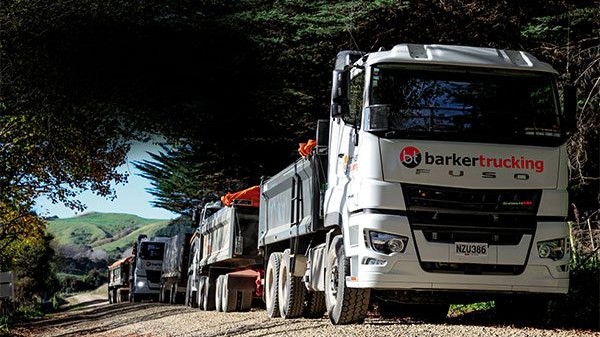
Retirement catches us all at some point, provoking changes in lifestyle and new hobbies. But Hawke’s Bay-based Michael and Tina Barker, faced with slowing down after the sale of their earth-moving business, took a different route. Their ‘retirement’ is a small trucking business with three Fuso truck-and-trailer tipping combinations – including some of the first new 510 Shoguns registered for New Zealand’s roads.
We catch up with Barker Trucking’s Michael Barker on a grey autumn evening outside the Higgins depot on Waitangi Road in Awatoto, a few minutes south of Napier, and immediately we are greeted by an infectious smile and a solid handshake; Michael is the walking personification of a can-do, get-on-with-it, and let’s-make-it-happen attitude.
Within these first few minutes, we become aware we are in the company of an owner-operator who understands the value of good-quality machinery, spec’d for the task, who is willing to keep it busy doing what it’s designed to do.
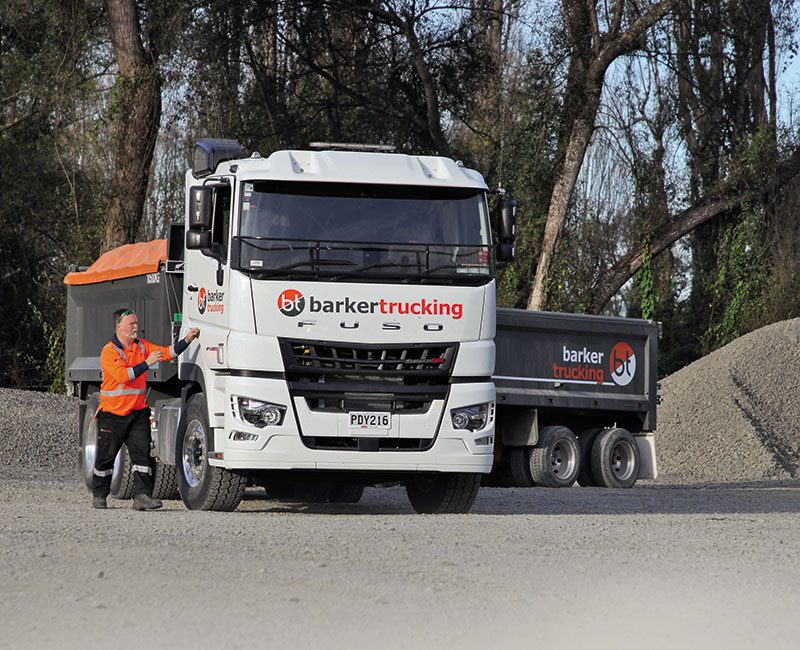
Swapping ponies for horsepower
Now 64, Michael grew up on the family farm. His grandparents were the first to break in the land after leasing a 750-acre (303ha) bare block from the Te Aute College Trust in 1910, with Michael’s father returning to the farm after his own father had a heart attack at 51. “It was a great place to grow up as a young fella, riding ponies, motorbikes and helping out around the place,” says Michael. To supplement farm income, Michael’s dad started a local farm-contracting business baling hay for neighbouring properties. This gave a young Michael the opportunity, like many rural Kiwi kids, to operate all manner of machinery, helping out Mum and Dad as soon as he was big enough to see over a steering wheel.
As with many father-and-son relationships, there can be a little friction at times. Michael reached a point where he realised it was high time for him to move on and start his own journey.
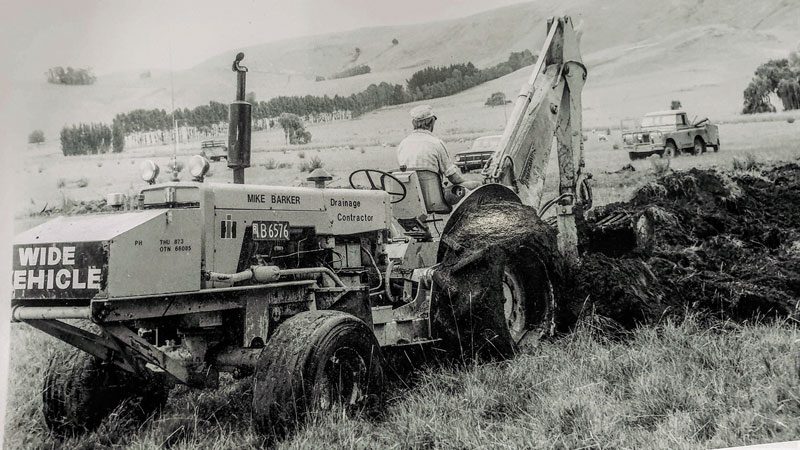
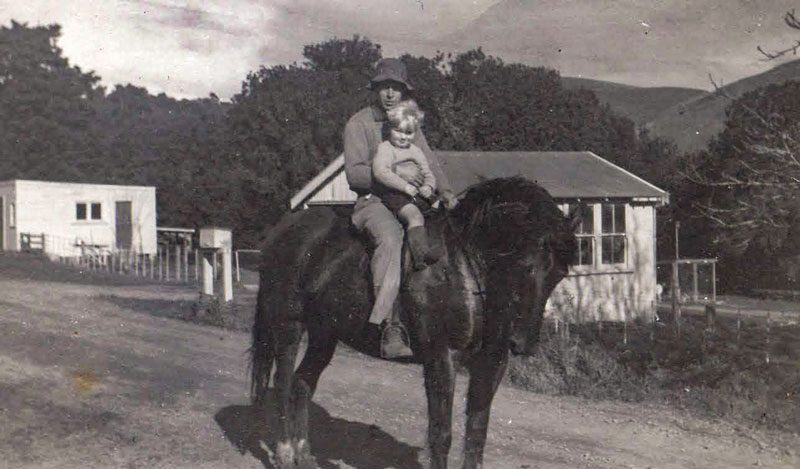
“I left school at about 17 – it just wasn’t for me – and got my first job working on a farm in Turamoe, near Hastings, with Rhod MacIntrye, who became a mentor to me at the time and in later years, a firm friend whom I held in high regard. Soon after, I came across an advert looking for tractor operators to work on big stations in Western Australia, and I thought, ‘that’s a bit of me’.”
Before heading to Australia in 1975, Michael needed his HT license. “The next day, I went into town with Dad in the old S-model Bedford off the farm. Dad drove it into town because he didn’t think it was quite right that I arrived there driving it before I had actually passed my test. I jumped into the driver’s seat with the cop, and off we went, driving around Waipukurau. Everything was going well, and then he said, ‘You’ve been driving a truck for a while, aye boy?’ And I said, ‘Why’s that?’ He said, ‘Well, you don’t drive with one arm resting on the window holding the steering wheel and the other on the gear lever.’ Whoops.
“I was 18 when I arrived in Australia and was excited to get my hands on some of the gear they run over there – the likes of a big pivot-steer 4×4 Steiger or similar. I got to the station to find that the tractor they had lined up for me was smaller than the one I had been driving back in Hastings – not quite what I was expecting. The station was in a great spot – southeast of Perth near the little town of Newdegate, close to Lake Grace.”
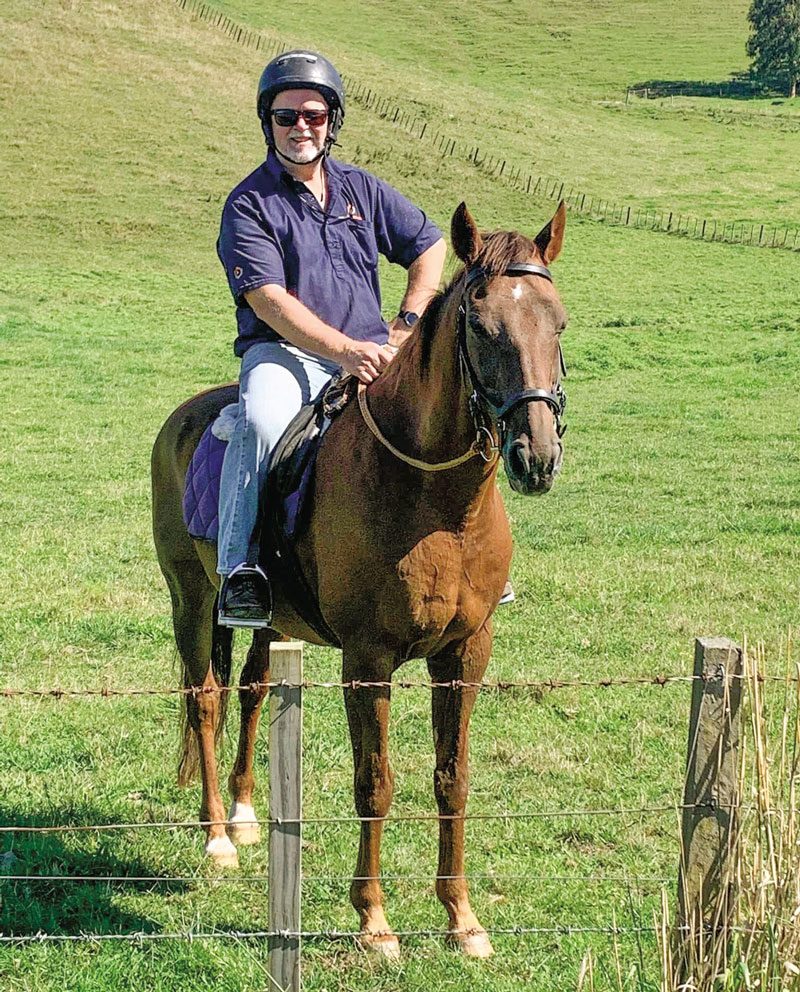
Cutting a trail
“Rail had the transporting of grain to the port sewn up. Everyone used to cart their grain to the local silos at the rail head. Rail would then charge you to cart the grain to the port and, with no competition, they pretty much charged whatever they wanted. It was how the Rail Protection Act worked. Wally Newman, the farmer I was then working for, thought, ‘Well, if I am going to be charged this amount, I might as well do it myself.’ The trouble with this was you had to be a licensed carrier, so Wally purchased a brand-new 8×4 G89 Volvo with a three-axle trailer and got things moving. As an unlicensed carrier, you were allowed to carry your own grain off your property and then return home with farm supplies for your farm, no one else’s – again protecting the rail network. As you can imagine, not everyone listened to these rules too much – many of the operators were running the gauntlet carting pretty much whatever,” Michael says.
“The first driver on the Volvo was hopeless. So, the next thing Wally said was, ‘Kiwi, you want to take some grain to Perth?’ I was like, ‘Yeah, sweet-as.’ It was a neat drive – about a 400km trip each way – and there was about 2500 tonne of barley to move.
“We started running fertiliser for the neighbours and ourselves as backloads, and that’s when the midnight runs came in, depending on whose load you had. It was a lot of fun. Drivers all had 25W CBs and you could talk for miles so we knew where all the inspectors were – a real game of cat and mouse.”
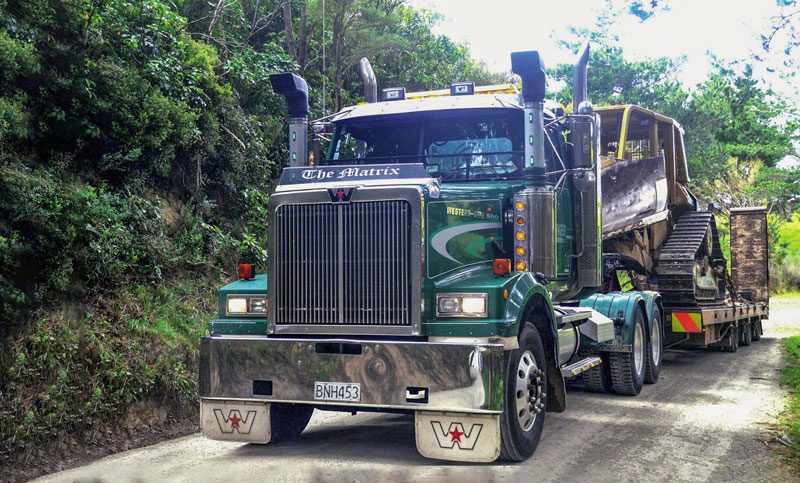
In Australia, Michael learned to see an opportunity and have a go. The job with Wally was seasonal, so in the off-season, Michael would head out on other work – but he tried to be more focused on the earth-moving work. One job was in the desert, operating a grader for the Australian Main Roads Department. “It was not long before I could see the potential for grader work on farms, doing roading as well as catchment work for dams. So, I suggested to Wally that we buy a grader and provide those services to the locals; that really was the beginning. Australia was my training ground; I grew up over there.
“I have a saying that sums up this stage of my life. ‘When I was 16, how little my father knew. When I was 21, I was amazed at how much he had learnt in just five years…’ [Paraphrased from Mark Twain – Ed.] I carry that saying with me all the time; it’s even my tag-line on social media.”
No place like home
When Michael arrived home about four years after his Western Australia OE, he was a little lost and wondering what to do with himself. A farming neighbour, Hugh McBain, let on that the local Hastings harvesting contractor was shutting down and trying to sell off his machines.
“He said, ‘If you buy his business, I will give you your first year’s harvesting fee in advance so you can go buy those machines.’ Hugh ran 400 acres [162ha] of grain and grass seed, so we shook hands on his idea, which was the start of my contracting business.
“Rhod’s farm at Turamoe was also extensively cropped. I put a lot of effort into developing and solidifying the harvesting business, even buying out another contractor who wanted out. Then one day, again looking to expand, I told Dad that I wanted to buy his hay-making business as it complemented what I was already doing. Eventually, that was purchased and absorbed into the harvesting business,” explains Michael.
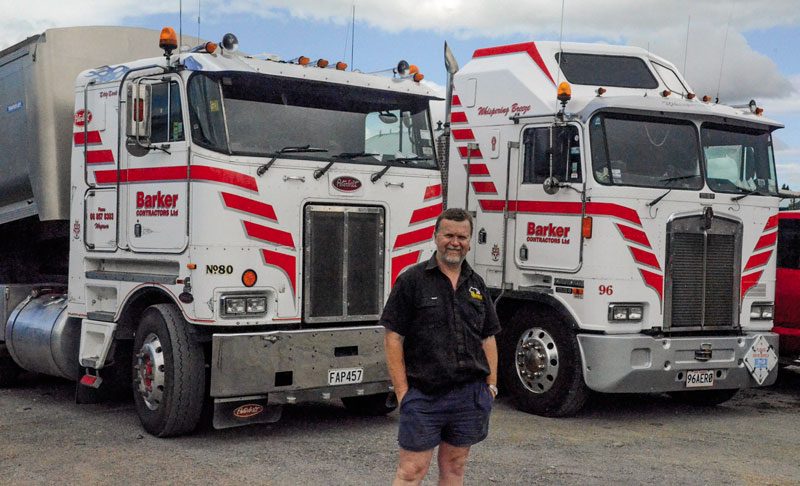
As the harvesting and hay-making business was mostly seasonal, Michael started looking for opportunities to fill in the winter off-season. “We were one of the first to start using small three-tonne excavators in the bay area. It proved very popular with all manner of confined civil works, and we purchased a second machine in quick succession.”
Things started to get busy rather quickly; running the harvesting/hay-making business through the day and night and trying to run a civil business during the day was certainly taxing, Michael says.
In the late 1990s, he bought a yard in Waipawa.
“The local council was shedding assets, so we purchased about 8000m2. In a town made up of workshops, offices and yard space, you had to be in town to do business,” Michael explains. “However, I was working every waking hour, night and day. Something had to give, so in 2000 we decided to sell off the harvesting/hay operation and concentrate on the civil contracting. At this time, the civil business was made up of a small fleet of excavators and small tip trucks. In fact, it is here that Scott [Tate – more on him later] got his start in trucking with me in a Ford 1017 N-series.
“The GFC recession bought about big change. I thought, ‘There are two things you can do in a recession: you can grow and make the most of the opportunity or close down. So, I grew. I went out and found some key people that were getting laid off with other businesses. I also brought in a great operations manager – Dallas Manning – who was key to the business moving forward.”
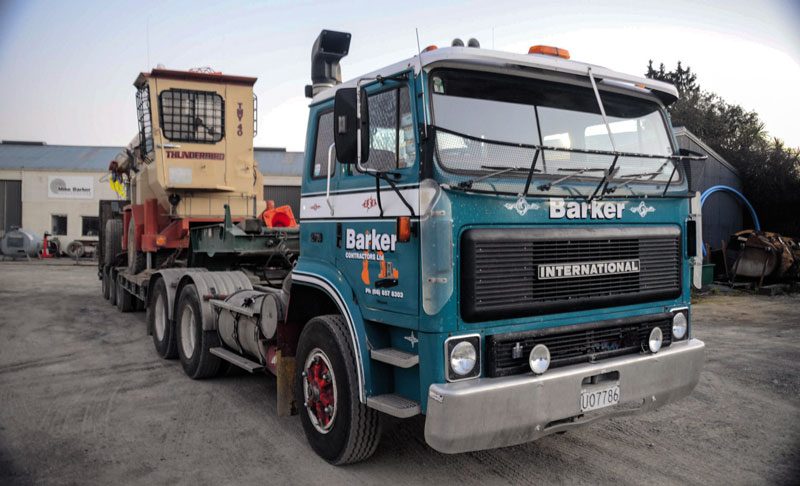
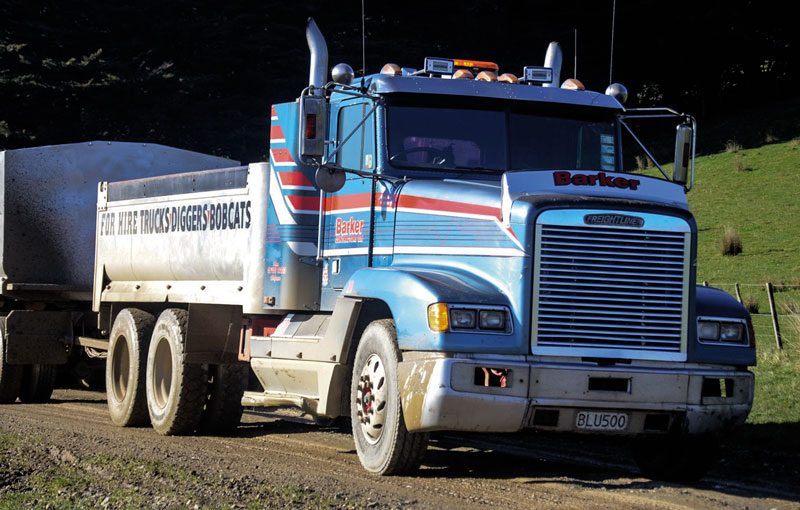
Wood from the trees
An opportunity to move into forestry roading construction and maintenance led Barker Contracting to set up its own quarries to supply clients’ needs. This bought about the need for the likes of crushing plants and bigger trucks. “We purchased a succession of American trucks – an ex-Alexanders FLD Freightliner, an ex-Brenics Western Star, some Kenworths, and an honest Peterbilt. Dallas had a passion for American trucks, big noisy, dusty, rattly things, but fun to drive.”
As the forestry business grew, more equipment was purchased, including a pair of Komatsu bulldozers, a D65 and a D61. Later, Michael also imported gear from Britain’s largest Cat dealer, Finnings, to complement the quarry operations. The first was a loader, which was in the yard just one week when Michael got a call from Bagries in Otaki.
Bagries heard he had the loader and wanted to purchase it immediately, so a deal was struck, and Michael got back on the phone to Finnings and imported another, to which his plant manager quickly said, ‘Now, ya not selling this one’.
“We had reached a stage where we had three quarries, strategically placed to work alongside the forestry work. It was extremely hard; we were dealing with more and more retail sales in town as well as other companies wanting to buy our products. So, we decided to simplify things and cut it back to just the one alongside the Waipawa River, beside the main bridge on the south side of town.
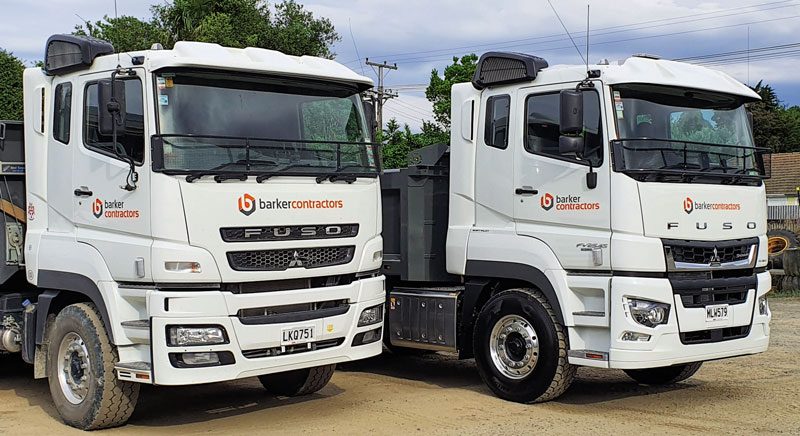
“On Christmas Eve 2020, I received an email from the regional council saying that they were closing all quarries on the Waipawa and Tukituki Rivers, effective immediately, as they perceived a risk of spreading Chilean needle grass along the rivers. There was no warning at all. I was at the first council meeting after the announcement and – fair to say – a heated address was given to the councillors about their lack of forward planning and no opportunity to plan a strategic exit and removal of processed stock. “To this day, there is still $150,000 of our product behind locked gates beside the river at Waipawa.
“Over the Christmas break, it was a massive exercise to find a site, get our guys to start moving the plant, set it up again and keep the team employed. That definitely was a challenge, but I was able to call on Hayden Satherly and developed another quarry beside his HES Earthmoving operation. He was great; he really helped,” says Michael.
“I have always enjoyed being on the tools at the job site. You are right where the action is, alongside the client, talking with them, humouring them and solving problems. I’m not in there wearing a tie, I’m there as a driver or operator. I also enjoy being away on the road. The Western Star set up with a widener transporter doing OD loads would be my favourite from within the fleet over the years.”
Forestry work is challenging, and Michael decided it was time for a general manager to help run the business. John Masters was employed to help. “He was good at showing me where things were going wrong, and it was at this time that I sold off equipment and refocused the business. John’s background was in chip- sealing, so we stepped into that market.”
New roads
In 2021, the stresses and strains brought about by the global pandemic in took their toll on many. For Michael and his wife Tina, change was in the wind.
“We had a great operation, with 17 staff running sweetly, but it was just time to move on. After 41 years, I wanted to do the right thing and find a private owner rather than selling everything to a big organisation. I started looking around, and found a couple of possibilities, and went through due diligence, but nothing came of those. So, I thought, ‘Stuff it. I will employ a general manager and let him run the business’.
“The general manager I employed was keen to purchase the business over five years or thereabout. But after only four months, he came to me and said he wanted to purchase it right there and then. So that was it. Just like that, I sold the civil and quarry business,” Michael says.
“I kept one truck and trailer unit. I thought I still needed something to do, and I also had the 460 Shogun on order. We ended up with the two trucks contracting to the new owner, continuing to deliver the quarry’s product when required.
“However, we have formed great working relationships elsewhere – Higgins in Napier, Awakeri Drainage in Hastings and Damion Stapp [who we’ll meet later] – and this increased workload has led to the second new 510 hitting the road. It’s nice now to just get back to what it’s all about, jump in the cab and go for a drive.”









